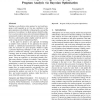Free Online Productivity Tools
i2Speak
i2Symbol
i2OCR
iTex2Img
iWeb2Print
iWeb2Shot
i2Type
iPdf2Split
iPdf2Merge
i2Bopomofo
i2Arabic
i2Style
i2Image
i2PDF
iLatex2Rtf
Sci2ools
55
Voted
OOPSLA
2015
Springer
2015
Springer
Learning a strategy for adapting a program analysis via bayesian optimisation
Building a cost-effective static analyser for real-world programs is still regarded an art. One key contributor to this grim reputation is the difficulty in balancing the cost and the precision of an analyser. An ideal analyser should be adaptive to a given analysis task, and avoid using techniques that unnecessarily improve precision and increase analysis cost. However, achieving this ideal is highly nontrivial, and it requires a large amount of engineering efforts. In this paper we present a new approach for building an adaptive static analyser. In our approach, the analyser includes a sophisticated parameterised strategy that decides, for each part of a given program, whether to apply a precision-improving technique to that part or not. We present a method for learning a good parameter for such a strategy from an existing codebase via Bayesian optimisation. The learnt strategy is then used for new, unseen programs. Using our approach, we developed partially flowand context-sensit...
| Added | 16 Apr 2016 |
| Updated | 16 Apr 2016 |
| Type | Journal |
| Year | 2015 |
| Where | OOPSLA |
| Authors | Hakjoo Oh, Hongseok Yang, Kwangkeun Yi |
Comments (0)

